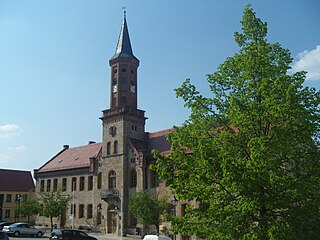
Kołobrzeg is a city in the West Pomeranian Voivodeship in north-western Poland with about 47,000 inhabitants. Kołobrzeg is located on the Parsęta River on the south coast of the Baltic Sea. It has been the capital of Kołobrzeg County in West Pomeranian Voivodship since 1999, and was in Koszalin Voivodship from 1950 to 1998.
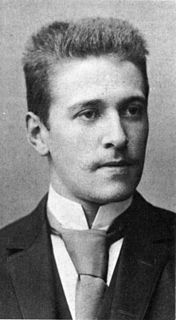
Hugo Laurenz August Hofmann von Hofmannsthal was an Austrian prodigy, a novelist, librettist, poet, dramatist, narrator, and essayist.

Caspar Peucer was a German reformer, physician, and scholar of Sorbian origin.
During the Roman Republic, nobilis was a descriptive term of social rank, usually indicating that a member of the family had achieved the consulship. Those who belonged to the hereditary patrician families were noble, but plebeians whose ancestors were consuls were also considered nobiles. The transition to nobilitas thus required the rise of a non-noble individual to the consulship, who was considered a "new man". Two of the most famous examples of these self-made "new men" were Gaius Marius, who held the consulship seven times, and Marcus Tullius Cicero.

Jakob Fuggerof the Lily, also known as Jakob Fuggerthe Rich or sometimes Jakob II, was a major German merchant, mining entrepreneur and banker. He was a descendant of the Fugger merchant family located in the Free Imperial City of Augsburg, where he was born and later also elevated through marriage to Grand Burgher of Augsburg. Within a few decades he expanded the family firm to a business operating in all of Europe. He began his education at the age of 14 in Venice, which also remained his main residence until 1487. At the same time he was a cleric and held several prebendaries, even though he never lived in a monastery. Fugger is held to be one of the wealthiest individuals in modern history, alongside the early 20th century industrialists John D. Rockefeller and Andrew Carnegie.

Königs Wusterhausen is a town in the Dahme-Spreewald district of the state of Brandenburg in Germany a few kilometers outside Berlin.

Wolin is a town situated on the southern tip of the Wolin island off the Baltic coast of Pomerania, modern Poland. The island lies at the edge of the strait of Dziwna in Kamień Pomorski County in the West Pomeranian Voivodeship.

The Thomanerchor is a boys' choir in Leipzig, Germany. The choir was founded in 1212. At present, the choir consists of about 90 boys from 9 to 18 years of age. The members, called Thomaner, live in a boarding school, the Thomasalumnat, and attend the Thomasschule zu Leipzig, a Gymnasium school with a linguistic profile and a focus on musical education. The younger members attend the primary school 76. Grundschule in der Manetstraße. Johann Sebastian Bach served as Thomaskantor, director of the choir and church music in Leipzig, from 1723 to 1750.
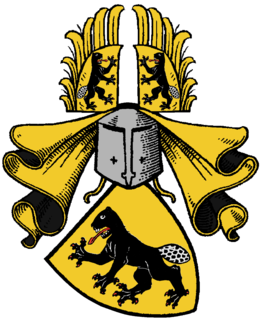
The Bibra family was one of the leading Uradel families in Franconia and present day Thuringia from the mid-15th century to about 1600. Later on the family rose from Reichsritter to Reichsfreiherr. After the Holy Roman Empire dissolved, they were made ‘’Freiherr’‘ (Barons) of Bavaria and Bohemia.

Elias Gottlob Haussmann was a German painter in the late Baroque era. Haussmann served as court painter at Dresden, and from 1720 as the official portraitist at Leipzig. He is mostly known for his portrait of Johann Sebastian Bach which was painted in 1746.

Frederick Michael, Count Palatine of Zweibrücken-Birkenfeld was a member of the Wittelsbach dynasty. He was the son of Christian III of Palatinate-Zweibrücken and Caroline of Nassau-Saarbrücken and a member of the House of Palatinate-Zweibrücken-Birkenfeld, a branch of the House of Wittelsbach. He was the father of the Bavarian King Maximilian I Joseph.

Pomerania during the Early Middle Ages covers the History of Pomerania from the 7th to the 11th centuries.
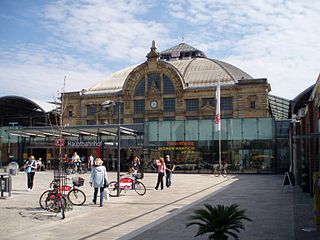
Halle (Saale) Hauptbahnhof is the main railway station in the city of Halle in southern part of the German state of Saxony-Anhalt. The station is situated east of the city centre and is a category 2 station.
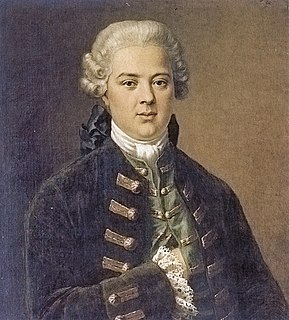
The Hanseaten is a collective term for the hierarchy group consisting of elite individuals and families of prestigious rank who constituted the ruling class of the free imperial city of Hamburg, conjointly with the equal First Families of the free imperial cities Bremen and Lübeck. The members of these First Families were the persons in possession of hereditary grand burghership of these cities, including the mayors, the senators, joint diplomats and the senior pastors. Hanseaten refers specifically to the ruling families of Hamburg, Lübeck and Bremen, but more broadly, this group is also referred to as patricians along with similar social groups elsewhere in continental Europe.

Thomaskantor is the common name for the musical director of the Thomanerchor, now an internationally known boys' choir founded in Leipzig in 1212. The official historic title of the Thomaskantor in Latin, Cantor et Director Musices, describes the two functions of cantor and director. As the cantor, he prepared the choir for service in four Lutheran churches, Thomaskirche, Nikolaikirche, Neue Kirche and Peterskirche. As director, he organized music for city functions such as town council elections and homages. Functions related to the university took place at the Paulinerkirche. Johann Sebastian Bach was the most famous Thomaskantor, from 1723 to 1750.

Paschen Ritter und Edler von Cossel, was a German lawyer, doctor of laws, syndic, canon of the Hamburg Cathedral chapter, and owner of two Holsteinian estates, Gut Jersbek and Gut Stegen. He led a successful public life, and, in 1769, became Konferenzrat to the Danish royal household. Cossel and his second wife are buried in the forest adjacent to the park on the Jersbek estate.

Stieglitz is a surname originating in Germany. Stieglitz being German for goldfinch, it is considered to have been an ornamental eke-name originally applied to a prominent family, noticeable in appearance for particularly blonde-coloured hair, of Ashkenazi Jews residing within what is now central Germany, from whom Ludwig von Stieglitz was raised to the Russian nobility, and of Protestant Leipzig patricians of German nobility. With the consolidation and expansion eastwards of the German Empire, the name spread. The original German name has also shifted orthographically to Stiglitz and beyond; later, Stieglitz was also transcribed to Sztyglic in Polish and Штиглиц in Russian.

Hanns Diehl was a German-Austrian artist influential as the founder of Vienna's Künstlerbund Segantini (1921–1938).

Georg Joachim Göschen was a German publisher and bookseller in Leipzig, Kingdom of Saxony, notable for typography and his publications of music and philosophy. He was the patriarch of the Goschen family, whose English branch rose to prominence as bankers and politicians, including the Viscounts Goschen and Goschen baronets.
Karl Günther Ernst Felix Becker was a German art historian
